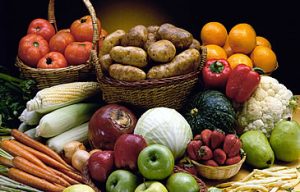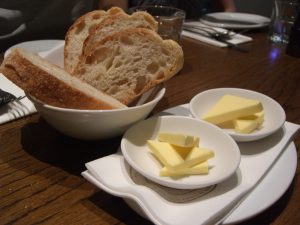
When I hear people talk about carbohydrates, I usually think of pasta and bread. But, it turns out, there is so much more to it! There are different types of carbohydrates, and then there is fibre and starch (I had heard of that from my love of potatoes), all with different roles to play.
So, here are 5 things I discovered in my studies…
1. Interestingly, despite the popularity of low carb diets like Atkins, carbohydrates are the one type of food that UK dietary guidelines say we should consume the most of (260g), and what’s more it is the only one where they say consume ‘at least’ 260 grams (i.e. minimum limit), as oppose to consume ‘less than x’ (i.e. maximum limit) which they use for sugar, fats, salt. It seems to be the most important food stuff.
2. Reading all the media, I thought sugar was bad, but again it is more complex than that. Most carbohydrates are ultimately broken down into a simple sugar called glucose which is the main energy source for the body. So all our energy is actually from a sugar – it’s not bad; it’s essential! (You can read a little about ‘bad’ sugar in my related film review post here).
The body needs a steady stream of glucose – a steady ‘blood-glucose level’ as glucose is the only fuel brain cells can use. I think that is why I get cranky and even dizzy when glucose levels peak and plummet.
3. All the ‘-oses’ that have names like groovy chocolate bars (Galactose, Fructose, Lactose, Sucrose, Maltose) are all carbohydrate sugars that ultimately are broken down by the body into glucose.
4. The simple carbohydrates I had heard about (e.g. in white bread, past and rice) are so called because they are single sugars (monosaccharides; mono=one) and these are not so good in excess apparently because they release the glucose too quickly into the body and you get ‘sugar spikes’.
The better ones are complex carbohydrates (e.g. in fruit and vegetables), again so called because they contain two or more sugar molecules joined together, and so need more time to be broken down and give you that ‘steady blood-glucose level’ that you need. How very logical!
There is a great tool called the GL (Glycemic Load) which can help you identify which foods will release glucose more quickly or slowly.
At the same time, with my obsession with holistic approaches, I found myself nodding in agreement when I read that sometimes it is not useful to think in terms of individual food items or types, since for example the absorption of carbohydrates/glucose will be affected by other elements in the meal such as fats or fibre.
Glucose release will not be the same if you eat a slice of bread with butter, compared to a slice of bread alone. Makes total sense!

5. Insulin is a hormone that is released when you eat, and create, glucose and allows or ‘unlocks’ cells to absorb glucose. If your body cannot produce insulin or the insulin it produces is not so effective, as with diabetes sufferers, then you can / need to inject it to help control your blood sugar levels.
Diet can also help, particularly with type 2 diabetes. There are reports of research showing diets (low carb and low calorie) can reverse diabetes – I found out what ‘reversing’ diabetes actually means from the the UK Global Diabetes Community .
Final thought, whatever kind of a diet you follow, it seems carbohydrates are essential and unavoidable. The complex ones though, seem to be the best source.
These are some of the sources I found where you can learn more about carbohydrates;
https://www.hsph.harvard.edu/nutritionsource/carbohydrates/
https://www.livescience.com/51976-carbohydrates.html
